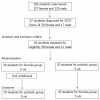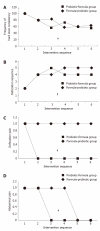Pediatric functional constipation treatment with Bifidobacterium-containing yogurt: a crossover, double-blind, controlled trial
- PMID: 22025880
- PMCID: PMC3198021
- DOI: 10.3748/wjg.v17.i34.3916
Pediatric functional constipation treatment with Bifidobacterium-containing yogurt: a crossover, double-blind, controlled trial
Abstract
Aim: To evaluate the treatment of pediatric functional chronic intestinal constipation (FCIC) with a probiotic goat yogurt.
Methods: A crossover double-blind formula-controlled trial was carried out on 59 students (age range: 5-15 years) of a public school in Belo Horizonte, MG, Brazil, presenting a FCIC diagnostic, according to Roma III criteria. The students were randomized in two groups to receive a goat yogurt supplemented with 10(9) colony forming unit/mL Bifidobacterium longum (B. longum) (probiotic) daily or only the yogurt for a period of 5 wk (formula). Afterwards, the groups were intercrossed for another 5 wk. Defecation frequency, stool consistency and abdominal and defecation pain were assessed.
Results: Both treatment groups demonstrated improvement in defecation frequency compared to baseline. However, the group treated with probiotic showed most significant improvement in the first phase of the study. An inversion was observed after crossing over, resulting in a reduction in stool frequency when this group was treated by formula. Probiotic and formula improved stool consistency in the first phase of treatment, but the improvement obtained with probiotic was significantly higher (P = 0.03). In the second phase of treatment, the group initially treated with probiotic showed worsening stool consistency when using formula. However, the difference was not significant. A significant improvement in abdominal pain and defecation pain was observed with both probiotic and formula in the first phase of treatment, but again the improvement was more significant for the group treated with B. longum during phase I (P < 0.05). When all data of the crossover study were analyzed, significant differences were observed between probiotic yogurt and yogurt only for defecation frequency (P = 0.012), defecation pain (P = 0.046) and abdominal pain (P = 0.015).
Conclusion: An improvement in defecation frequency and abdominal pain was observed using both supplemented and non-supplemented yogurt, but an additional improvement with B. longum supplementation was obtained.
Keywords: Adolescents; Bifidobacterium longum; Children; Functional chronic constipation; Probiotic; Yogurt.
Figures


References
-
- van den Berg MM, Benninga MA, Di Lorenzo C. Epidemiology of childhood constipation: a systematic review. Am J Gastroenterol. 2006;101:2401–2409. - PubMed
-
- Joint FAO; WHO. Working Group Report on Drafting Guidelines for the Evaluation of Probiotics in Food. London, Canada: 2002.
Publication types
MeSH terms
LinkOut - more resources
Full Text Sources
Medical

